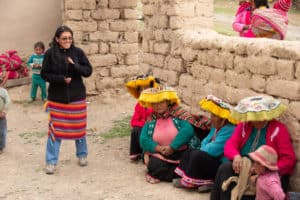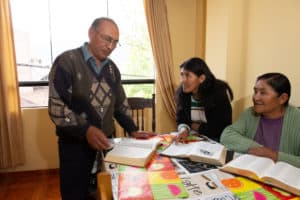
Thanks to Luisa and her ATEK colleagues, thousands of Quechua women are learning to read the translated Scriptures and gaining a deeper relationship with God.
High in Peru’s Andes Mountains, Luisa Cahuana meets regularly with Cusco Quechua women who are hungry to read Scripture in their language. Many are new believers who have been introduced to Christ through the ministries of ATEK, Wycliffe’s partner organization in southern Peru. Most of the women Luisa serves in her role as literacy co-ordinator for ATEK grew up with little education, and few learned to read at all.
It’s a reality that Luisa is determined to change—even though it can mean long periods of separation from her own family as she travels to visit the remote and widely-scattered women’s groups in the region. It can also mean arduous journeys by bus over steep, winding dirt roads, or grueling hikes over high mountain passes. But it’s a sacrifice Luisa is willing to make because she wants her Quechua sisters to have the same access to Scripture that she enjoys.
Asked what motivates her to make such sacrifices, tears well up in Luisa’s eyes as she struggles for words.
“God has told me I need to do this,” she says as tears begin to flow. “I do it to help my sisters know the Word of God.” When I hear about their problems and struggles, I feel that I have to be with them.”
Sometimes, adds Luisa, her children plead with her to stay home.
“They say, ‘Mom, don’t leave. We want you to stay with us.’ So, I have this struggle. When I come here I am with the women and I want to be with them, and then when I’m at home, I want to be with my kids.”
Growing up in poverty as the daughter of a pastor (Luisa’s father was a key contributor to the translation of the Cusco Quechua Bible), she was taught that she could talk to God about her own and her family’s struggles, and that God could handle her questions.
“When will you give us a home where we can live comfortably like everyone else around us who seem to live so happily in their houses?” she would ask the Lord.
However, while Luisa was raised to freely ask God tough questions, this openness wasn’t the norm for most Quechua women.
In fact, during Luisa’s childhood, women had few rights in society and weren’t allowed to vote. Sadly, the environment was similar in the church, where women didn’t hold leadership positions and few learned to read.
“The biggest problem is with reading comprehension,” says Luisa, before explaining that Quechua women generally aren’t accustomed to reading. “This is a huge, lifelong process. We need consistent follow-up. Little-by-little we see change.”
As each woman grows in her ability to read and write, they are able to understand Scripture better, and then are equipped to teach and lead the women in their church community.
“Our goal is that each church will use the Word of God and comprehend it,” says Luisa. “In that way their lives will be changed.”
Adapted from “Out of the Rubble,” Word Alive magazine, Summer 2015
[learn_more caption=”Learn how you can support ATEK”]


